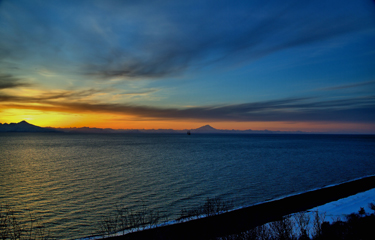Cook Inlet’s federal waters shut down to commercial fishing

The North Pacific Fisheries Management Council voted this week to close down a large area in Alaska’s Upper Cook Inlet to commercial fishing, a move that stands to damage an already struggling fishery.
The unanimous NPFMC vote closes Upper Cook Inlet’s gillnet fishery’s federal waters, which begin three miles offshore and make up a productive chunk that sits in the middle of the grounds. The federal waters were managed by state officials for years, but a local commercial fishing organization, the United Cook Inlet Drift Association (UCIDA), sued in 2013 to revert to federal management.
The waters became mired in a years-long debate over how to restructure the plan to manage salmon runs. Alternatives included co-management between state and federal officials, but Alaska Governor Mike Dunleavy’s administration said it was unwilling to work with federal officials and proposed Alternative 4, which would close federal waters.
Despite strong opposition from commercial fishermen, local city governments, and others, the council adopted Alternative 4 in a vote on Monday, 7 December.
According to UCIDA, which represents 570 commercial drift gillnet fishermen, NPFMC received more than 240 written comments against the proposal and just one comment in favor, which came from the Kenai River Sportfishing Association. The council also heard 34 oral testimonies against Alternative 4, many of them from representatives from area towns like Homer, Soldotna, and Kenai, saying their economies would be hit hard by the closure.
Robert Ruffner, a Soldotna resident and former member of the Board of Fisheries, told Alaska Public Media the closure could cause a chain reaction, shutting down processors, which would in turn make it hard for fishermen to find markets.
“Our communities are going to suffer pretty heavily, probably more than the numbers reflect in terms of the harvest that occurs out there, because our processors are rapidly becoming the limiting factor in what they can continue to stay open and operate under those environments," Ruffner said.
On its website, UCIDA criticized Alaska Department of Fish and Game Commissioner Rachel Baker.
“Baker’s primary argument was that the state of Alaska refuses to accept oversight by the federal government in [its] management of Cook Inlet salmon, so there was no point in doing anything other than closing the [federal waters]. Ms. Baker also said, many, many times, that the extra costs of managing the Cook Inlet fishery would be just too unreasonable if they had to work with the federal government. In other words, a few additional management expenses would not be worth preserving an historic, valuable commercial fishery and all of the communities that depend on commercial fishing,” the UCIDA said in a statement posted on its website.
Meanwhile, Cook Inlet fishermen have been fighting declining runs for years, and many have exited the fishery as a result.
“Fishermen have been leaving the fishery already for the last several years. It’s hardly economically viable, and this really is the nail in the coffin,” fisherman Georgie Heaverly told Alaska’s KDLL.
According the Alaska Department of Fish and Game, Upper Cook Inlet had its worst season in recorded history in 2020, with a harvest of just 1.2 million salmon, less than half the 10-year average, for ex-vessel value of USD 5.2 million (EUR 4.3 million).
Photo courtesy of Kyle Water/Shutterstock






Share